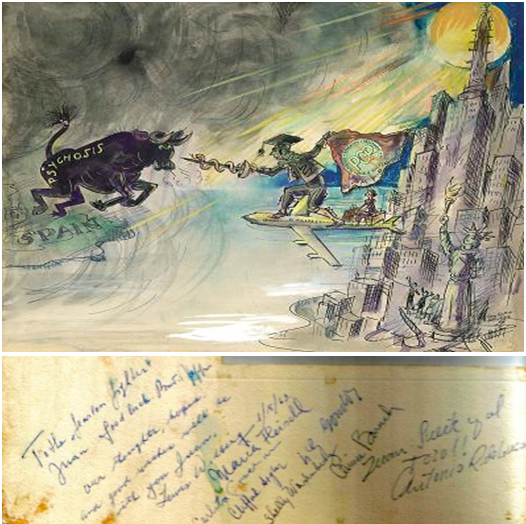Chance would have it that there are unforeseen turning points in the professional life of Juan Campos. One is the transition from his early wish to become a doctor and a “heart surgeon”, as his doctorate in Medicine and Surgery testifies, to the one, as he metaphorically said, of a “surgeon of souls”. The other has to do with a change of groups, cultures and languages along the trajectory of training, but very particularly his natural and very personal group point of view which leaves a characteristic and indelible imprint on everything he does in life. In some short brush-strokes we shall make good these ideas.
In Venezuela, while validating his medical degree and trying to earn a living, he creates and organizes together with a psychiatrist colleague a psycho-pedagogic service for the educational system of Caracas. Then also begins a life-long friendship with a young psychoanalyst his same age who introduces him to Freud and Klein, in this case and at that point in time an Anglo-Saxon Germanic graft in Hispanic cultural soil.
Upon return to Europe, at the IV International Congress of Psychotherapy, he comes into contact with S. H. Foulkes. He considers the latter’s presentation[1] the most group orientated one and, in consequence, applies for and obtains a British Council Scholarship[2] to be able to train during one year with Foulkes at the Maudsley Hospital in London. This step implies two important changes: The first is a change from an authoritarian religious institution to which he belonged until then to what Juan Campos considered the democratic context of groupanalysis. The second change re lates to the immersion in an Anglo-Saxon country and culture, and training in English, a foreign language.
In London no formal training scheme existed and, after the year at the Maudsley Hospital, Foulkes referred Juan to the first and only centre that had a training program in analytic group therapy: The Postgraduate Center for Psychotherapy (later of Mental Health) in New York. The director of research of the Center came to interview him in London, and Juan applied for and obtained a Fellowship to train in New York. During four years he followed two training programs which led him to the diplomas of “Analytic Group Psychotherapy” and “Psychotherapy and Psychoanalysis”[3]. The training in New York reinforces the impact of the two dominant group contexts: an Anglo-Saxon country and culture and English, a foreign language. During the training came to the fore Juan’s already mentioned natural and very personal group point of view. This is particularly evident in the Community Project “The Living Room”[4] he presents as his Graduation Report. Since this project was for graduation in a group training program, he considered it adequate to develop, elaborate and present it as a group with his classmates Sheldon Waxenberg and Leila Zileli. As he mentions in the report, the Postgraduate Center did not permit this and they had to somehow divide it into three parts[5].
Half a century after Juan graduated from the PCP, perhaps it is time to include here as more than significant the watercolour his teachers and analysts gave him upon leaving New York, dedicated by his individual analyst “To the fearless fighter Juan”. The picture was painted by the husband of one of the teachers.
[1] S. H. Foulkes (1958) “Some Observations on Teaching Psychotherapy”, IV International Congress of Psychotherapy, Barcelona, 1-7 September 1958.
[4] 1963 A Part III Juan Campos Organization and Running of the socio-therapeutic club“The Living Room” in New York, 25 pp.; 1963 B Part I Sheldon Waxenberg;Structuring of the Referral Functions of the Club, 16 pp. 1963 C Parte II Leila Zileli.The history of the social club
[5] Years later, in 2002, Hanne Campos neither is able to present as a group the doctoral thesis elaborated in and with a group during five years. The University did not provide for such a case.


